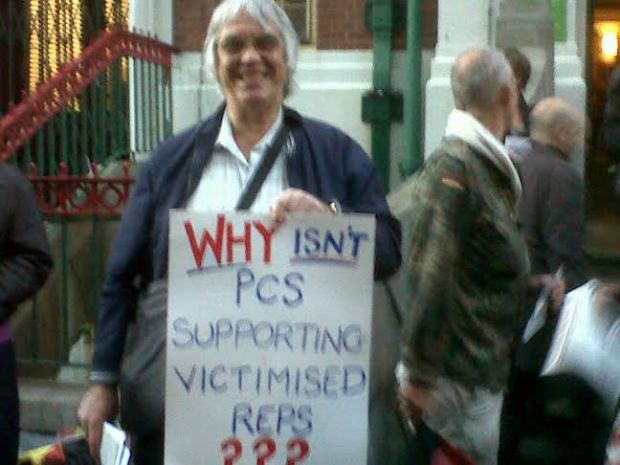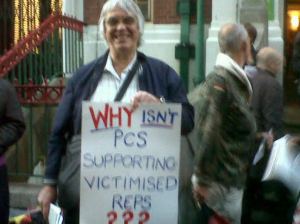 PCS members may be aware that the National Executive Committee recently issued a bulletin, headed ‘Support for Victimised Reps,’ allegedly aiming to set the record straight on John Pearson’s case.
PCS members may be aware that the National Executive Committee recently issued a bulletin, headed ‘Support for Victimised Reps,’ allegedly aiming to set the record straight on John Pearson’s case.
The same bulletin also referred to the case of Candy Udwin. This campaign has previously offered its complete support for Candy as we believe that all victimised reps should receive unequivocal support from their union. Follow this link for actions you can take to support her.
It is disgraceful, however, that rightful support for Candy is used to frame a bulletin aimed primarily at justifying throwing John under a bus.
John has responded to the NEC regarding the falsehood, misleading statements and half-truths in the bulletin, and provided us the correspondence which we reproduce below in full. He has also asked the NEC to circulate it as widely as the bulletin it refutes in the interests of balance. The response to this request remains to be seen.
Please share John’s response as widely as you can to counter the misinformation provided by the NEC.
Members attending Conference should also join the lobby on the Tuesday lunchtime in support of the fight to get PCS to support its members.
Lobby of PCS Annual Delegate Conference
The Brighton Centre, King’s Rd, Brighton, BN1 2GR
Tuesday 19 May, 12.30-14.00
All supporters welcome, bring flags and banners
Facebook event page here.
Add your name to the open letter here.
To: Mark Serwotka, General Secretary, PCS
Janice Godrich, President, PCS
By email
12 May 2015
Dear Mark and Janice,
My attention has been drawn to the branch bulletin BB/30/15, entitled ‘Support for Victimised Reps’, which was issued over your joint signatures on 6 May 2015.
In your paragraph headed ‘Conclusion’ on pages 4 and 5 you state, referring to me, “We are pleased that he won his case at Employment Tribunal, but we remain of the view that the union was right not to provide legal support for his case”.
Much of the rest of the content of the bulletin is directed at justifying that view and, although you do not anywhere in the bulletin refer to ADC motion A37 (copy at : http://tinyurl.com/kmokldm ), it is clear that the purpose of this content is to attempt to win branches to opposing that motion.
In the interests of balance in the supply of prior to debate information therefore, I would request that you circulate to branches this, my response to the content of the bulletin which is pertinent to consideration of that motion.
Please note that all correspondence referred to in this letter is available on a google drive at: https://drive.google.com/folderview?id=0BxyyYmWQEltrbnZlVEVFc1U2eUE&usp=sharing#list {NB – click once only on filenames listed on a google drive to open them – clicking twice opens and then instantaneously closes them}.
My substantive commentary on the issues that are addressed by motion A37 are contained in my letter of 3 March 2015 to members of the NEC (copy at : http://tinyurl.com/pcm45qg ). This letter called upon the NEC to overturn a reaffirmed negative decision of the National Disputes Committee upon my application for the union to support me following my successful Employment Tribunal verdict of unfair dismissal for trade union activities. I explained in that letter why the findings in that verdict were of crucial importance to the prospects for defending elected branch officers and reps who are victimised for carrying out their union duties. Sadly the NEC upheld the NDC’s decision.
I do not intend to take up space here repeating the points I made in that letter. However, I would urge branch delegates to ADC to read that letter and there are some additional points raised in the branch bulletin that I must address here.
In your paragraph quaintly entitled, ‘Campaign against NEC’ you state that, “a campaign has been carried out within the union and more widely against the NEC’s decisions in the case of John Pearson ….. The campaign has included a misleading and partial account of events”.
I think it is quite clear that the misleading and partial account of events is your own and this has continued to be spun within the branch bulletin. I will deal with the misleading and partial statements contained in the branch bulletin, in the order that they appear :
1) Misleading : “John’s case has been the only one involving the dismissal of a PCS rep that has not been supported to an ET” (second page under heading, ‘Campaign against NEC’).
ADC delegates from other branches will be able to comment upon this assertion during the debate at ADC. I will comment on cases within my own branch which illustrate that this statement is untrue. In July 2013, just 2 months after my suspension by Hewlett Packard, my Deputy Branch Secretary, Glyn Hinchliffe, was selected for compulsory redundancy. After another CR’ed colleague whose circumstances in relation to the selection process were identical to Glyn’s (with the exception that the fomer was not a union rep), was reinstated upon internal appeal, the branch sought support from the union’s Legal Department for an Employment Tribunal claim by Glyn who had been treated in a discriminate fashion. Support was not forthcoming. In January 2014, one of the most senior casework reps on the BEC, Paul Higgins, who had played a leading role in representing members who had been unfairly selected for compulsory redundancy, was himself selected for compulsory redundancy. Paul applied for support from the union’s Legal Department for an Employment Tribunal claim. Support was not forthcoming.
2) Partial : “John had circulated PCS members in the HP North West Branch with employment data regarded by management as confidential.” (second page under heading, ‘Refusal to follow advice’).
One would expect trade union leaders to want to say a bit more than this, had they digested the verdict of the Employment Tribunal in this case (copy at : http://tinyurl.com/ozxkcs8 ). The Tribunal found that the employment data was that which an employer must supply to a recognised trade union in accordance with Section 188 (4) of the Trade Union and Labour Relations (Consolidation) Act 1992 and was information that was capable of being shared with the union’s members who were affected (paragraphs 54 and 55 of the verdict) and that the information could not be properly considered to be confidential (paragraph 76).
3) Partial (and I believe, false) : “John’s full time officer had advised him of the risk of disciplinary action from the employer.” (second page under heading, ‘Refusal to follow advice’).
In previous exchanges of correspondence with Mark Serwotka, I have made it clear that I do not recall, nor believe to be true, that I received any such advice from the full time officer, who was at that time Alan Brown. I have fully documented all of my responses to Mark. If he wants to sustain this particular assertion, then he should produce his evidence.
4) Partial (and irrelevant) : “John had previously issued material after receiving similar advice from a previous full time officer and from a Group President.” (second page under heading, ‘Refusal to follow advice’).
Again, I have to express doubt that the authors of the branch bulletin have read and digested the Tribunal verdict. The question of the previous instances in which redundancy job pool data was circulated by me as Branch Secretary acting on behalf of the BEC, was considered as material fact by the Tribunal. Evidence was heard over 3 days from 3 of the employer’s witnesses and 5 members of my Branch Executive Committee. Documentary evidence was submitted to the Tribunal and is referenced in the judgment. I was carrying out trade union activities when I circulated this material and it is unlawful for an employer to dismiss a union official for carrying out union activities.
5) Partial and misleading : “Against repeated advice from the union, John refused to participate in the internal HP disciplinary process. Again, John had acted on an individual basis, outside the shared responsibility that is essential in this situation” (second page under heading, ‘Refusal to follow advice’).
This assertion is one that has often been repeated by Mark. I described in the fourth to sixth paragraphs on page 2 of my letter of 3 March 2015 to the NEC (http://tinyurl.com/pcm45qg ), why I disagreed with Alan Brown’s advice that I should submit to HP’s disciplinary process, not least that to do so would have meant my acceptance of my removal as branch secretary by employer action. Indeed this is precisely what happened in the case of my colleague and friend, Sofia Azam, the victimised former branch chair at the PCS Ofqual branch. Sofia followed the advice of her full time official to submit to disciplinary procedure and was thereupon summarily debarred from continuing to act as branch chair. Sofia furthermore followed the putrid advice of her full time official to apologise to the employer for circulating employment relations data on behalf of her BEC but without the employer’s permission. The PCS Legal Team thereafter did not argue Sofia’s case on the basis that the employer had acted unlawfully in dismissing her for trade union activity. A fatal error that led to the loss of Sofia’s Tribunal and Employment Appeal Tribunal cases.
As also described in my letter to the NEC, my disagreement with Alan was resolved at the time.
Are Mark and Janice trying to argue that the union will only support victimised reps who have at all times agreed with FTO’s advice, whether that advice is right or wrong? It does appear to me that this is so and that this is a rather strange line to take in a union which is supposed to be lay member led.
6) Partial and misleading : “Despite John’s consistent refusal to accept the union’s advice, PCS officers and reps left no stone unturned in attempting to overturn HP’s actions”. (second page under heading, ‘Support for John’).
If indeed I “consistently” refused to accept “the union’s advice”, what – apart from my refusal of Alan Brown’s initial advice to submit to disciplinary procedure – were the subsequent refusals and precisely whose advice did I refuse? I am left wondering if Mark and Janice are holding against me here that I disagreed with Thompson’s advice that my Employment Tribunal case did not have reasonable prospects of success (which was self-evidently wrong since I won the Tribunal).
7) Partial : “Political lobbying took place at Westminster”. (top of page 3 under heading, ‘Support for John’).
This is the first I have heard about this. Why wasn’t I informed at the time?
8) Misleading : “We sought legal advice from the union’s solicitors on an Employment Tribunal claim. The legal advice was that an ET claim did not have reasonable prospects of success. In John’s case this added weight to the strong possibility that the fact that John had refused to follow the union’s advice would be exposed at a Tribunal”. (second paragraph on page 3 under heading, ‘Support for John’).
This is a staggeringly incompetent statement to see over the signatures of the two most senior elected officers of a trade union. Do Mark and Janice really not know that advice given by union and legal representatives to a claimant in Employment Tribunal proceedings is privileged?
9) Partial : “We looked at the possibility of organising industrial action, the most effective means of defending victimised reps. The GEC considered whether there was the prospect of balloting members on a group wide campaign of industrial action to secure John’s reinstatement. The view of the GEC was that any ballot would be unlikely to secure a positive vote in favour of action. Also, John accepted that there was no mood within the Branch for such a course of industrial action”. (third paragraph on page 3 under heading, ‘Support for John’).
In response to and remedy for, the partiality of this information, I am now disclosing two sets of correspondence, which I would urge ADC delegates to have the patience to read through.
Mark and Janice refer to GEC consideration of “the prospect of balloting members on a group wide campaign of industrial action to secure John’s reinstatement”.
The first set of correspondence (http://tinyurl.com/lzl82zm ) documents the debarment of my participation in that GEC consideration. Although I was one of my branch’s properly elected delegates to GEC, I was unconstitutionally removed from that position by a ruling of the Acting Group President (a PCS Left Unity supporter, Alan Skinner, who was also one of the persons who spoke against the motion seeking support for me at ADC 2014). The correspondence also documents the roles of the FTO, Alan Brown and of the National President in not dealing timefully with challenges to Bro. Skinner’s ruling, before my union membership was summarily terminated on 29 November 2013. I leave ADC delegates to form a view on whether they were out to get me.
The second set of correspondence (http://tinyurl.com/lqrl474 ) documents the issues of whether the ongoing Group industrial action over redundancies should be escalated and whether the aim of securing my reinstatement should be dealt with as a term of settlement of that action or escalated action, or whether, as the GEC apparently decided at the meeting I was debarred from, my branch should be invited to ballot on separate branch only action in pursuit of my reinstatement. My BEC was preparing a consultative ballot on the issues at the time that my union membership was summarily terminated on 29 November 2013.
10) Partial and misleading : “While he won his case, the Tribunal determined that he contributed to his own dismissal through his refusal to participate in the disciplinary process and his compensation would be reduced as a result by 50%. The Tribunal stated that his dismissal could have been avoided had he participated in the process”. (sixth paragraph on page 3 under the heading, ‘Employment Tribunal).
The Tribunal did not state that my dismissal could have been avoided had I participated in the process. Paragraphs 69 to 74 of the Tribunal judgment deal with this matter. What they say, in paragraph 69 was that my failure was in my not supplementing my assertion that I was carrying out trade union activities by specifically referring to the terms of the protective clause, S152 of TULR(C)A 1992. They also criticise the employer’s Labour Relations Manager for not advising the dismissing manager of the terms of S152. The Tribunal was even handed in this matter. There is no need for the union to be even handed in deciding whether it supports the actions of its elected reps when they are carrying out union activities.
The union should be partial when it comes to supporting our reps. As notion A37 proposes, we should be supported as a matter of principle.
11) Grossly false and misleading : “In fact, John secretly recorded the meeting with the NDC and then publicly offered the recording as part of his campaign against the NEC. This was an offensive and hostile act which clearly indicates a lack of good faith”. (fourth paragraph on page 4 under heading, ‘Further consideration of the case’).
I am extremely disappointed at the grossly untrue statement by Mark and Janice that I “publicly offered the recording as part of his campaign against the NEC”.
Janice wrote to me on 12 March 2015 asking if it was true that I secretly recorded my conversation with herself, Mark and John McInally from the NDC. I confirmed by return that it was true and explained my reasons. The correspondence is available at : http://tinyurl.com/n2o6zjz
In my reply I described why I felt that it was in my vital interests that I recorded my conversation with Mark in which I contested his implications that I and my BEC witnesses may had lied in giving evidence on oath to the Employment Tribunal.
Please note that I state therein the exact converse of what Mark and Janice assert in the branch bulletin : “I am happy to provide the recording for the NEC to listen to if it so wishes. Please note that I have not and have no intention of, placing the recording in the public domain”.
Such sloppiness with the facts in such a serious matter must cast doubt on the motivations of the General Secretary and National President.
(By the way, at this point, I express my ardent hope that Janice will not deign to be in the Chair of ADC whilst motion A37 is discussed!!)
Yours sincerely,
John Pearson









